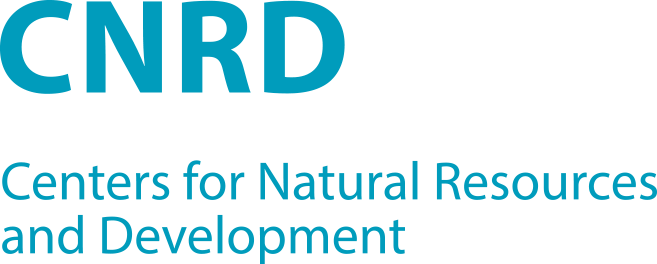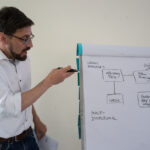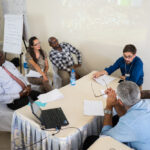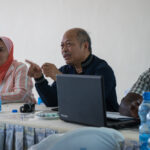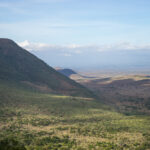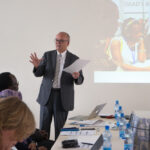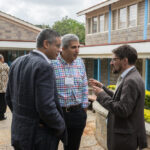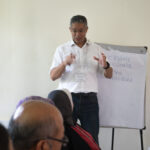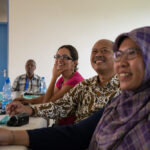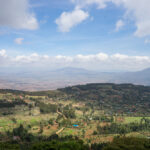The fifth “Resource Efficient Cities” Workshop was successfully conducted in Kenya

The fifth workshop of the Interdisciplinary Master Program “Resource Efficient Cities” (IMaREC), titled Training of Trainers (ToT) on “System Theory and Higher Education Didactics”, was hosted by Kenyatta Univeresity in Nairobi, Kenya from April 24 – 28, 2017. Four partner universities of the CNRD network participated in the workshop: TH Köln, Germany; ASU, Egypt; UGM, Indonesia; and UASLP, Mexico. Additionally, a representative from the University of Ghana joined the workshop as an associated partner of CNRD. Dr. Blumbach from the regional office of the German Academic Exchange Service (DAAD), Nairobi office graced the official opening of the workshop. All the participants were able to make a courtesy call to the Vice Chancellor where they were welcomed by Prof. Frederick Gravenir, the Deputy Vice Chancellor Research, Innovation and Outreach on behalf of the Vice-Chancellor of Kenyatta University Prof. Paul K. Wainaina who was outside the county.
The ToT workshop adopted a blending learning approach with three phases between online (distant) and contact phases. First phase (online), February – April 2017, explored the background and REC related knowledge level of participants through a questionnaire. Additionally, participants were provided with preparatory reading materials regarding didactics and scientific topics. The second (contact) phase in KU, April 2017, deepened the understanding of the IMaREC concepts and teaching approaches. Topics covered were City as a complex system, its metabolism, urban dynamics and the importance of interconnected responses to face its challenges, system logic / system thinking / system approach. The ToT also included introduction and practice on Problem Based Learning (PBL), as an active learning approach. The third phase (online), May – July, is planned to deepen the participants’ understanding and to apply the learnt content through tasks and assignments, which contributes to the curriculum development of IMaREC.
The workshop took place in a constructive and friendly atmosphere on Kenyatta University’s campus. It included an excursion to Nairobi peri-urban areas and Naivasha town, giving participants an insight into the rapid development and changes of the urban and rural landscape in Kenya. The participants were able to enjoy the beautiful landscape of the Great Rift Valley in Kenya.
As a next step after the workshop, the collaborating university partners will review all IMaREC modules based on the learnt workshop content.
- Prof. Dr. Johannes Hamhaber TH Köln University of Applied Sciences, Germany synthesize the workshop findings
- Exercise “Problem Based Learning”
- Prof. Dr. M. Baiquni, MA Universitas Gadjah Mada gives his feedback about the exercise “Problem Based Learning”
- East African Rift – close to Nairobi
- Dr Blumbach DAAD Regional Office informs the participants about the activities and programs of DAAD in East Africa
- Prof. Dr. Johannes Hamhaber TH Köln University of Applied Sciences, Germany discuss with Dr. Mohab Elrefaie Ain Shams University – Egypt and Dr. Mostafa Refat Ain Shams University – Egypt
- Dr. Mohab Elrefaie Ain Shams University – Egypt gives an introduction into system theory
- Prof. Dr. M. Baiquni, MA Universitas Gadjah Mada, Indonesia; Utia Suarma, M.Sc. Universitas Gadjah Mada, Indonesia; Ph.D. Lourdes Marcela López Mares Universidad Autónoma de San Luis Potosi, Mexico
- East African Rift – close to Nairobi
The 4th “Resource Efficient Cities” Workshop Series
Continuing the workshops’ series of the Curriculum Development of the Interdisciplinary Master Program “Resource Efficient Cities” (IMaREC) which started in Cairo, Egypt in June 2015, the 4th workshop took place in UASLP, San Luis Potosi – Mexico during the period 18th – 23rd July 2016. Four partner universities of the CNRD network in addition to UASLP participated in the workshop: TH Köln, Germany; ASU, Egypt; KU, Kenya; and UGM, Indonesia.
The workshop was twofold in that it included activities of both curriculum development and research. The curriculum development workshop aimed at defining course structures, learning units and full description of the four core courses comprising the first semester of IMaREC in terms of course aims/objectives, Intended learning outcomes (ILOs), course content, teaching method(s) and assessment method(s). The research workshop aimed at promoting the concept of resource efficient cities and prioritized relevant topics of the city as a socio-ecological and thus metabolistic system. This was done by developing a systematic urban case study approach for a scalable cities, including Cairo, Egypt (mega city), San Luis Potosi, Mexico and Yogyakarta, Indonesia (medium size cities), and Kisumu, Kenya (small size city) in order to pave the road to draft relevant and specified research proposals responding to calls of bilateral or multilateral funding options.
The workshop was enriched by two open sessions with inputs from international guests of topics related to resource efficient cities such as “Urban metabolism and system theory”, “Water efficient urban systems”, and “Introducing urban sustainable model: La Pila”. Professors and students from the different faculties of UASLP joined the opening sessions and participated actively in the discussions. Furthermore, the workshop included a very interesting field trip to explore urban strategies for food production and water management in a local elementary school as a sustainable model developed by UASLP, where sustainable practices of rainwater harvesting, urban farming, greenhouse, fruit trees farm, waste water treatment, soccer field design and photovoltaic design have been implemented. The field trip also included visits to local brick makers and to a social housing development “Villa Esperanza” for exploring environmental-social design aspects and community governance.
Moreover, the workshop hosted an important event for strengthen international cooperation; based on the CNRD agreement, a bilateral agreement between ASU, Egypt and UASLP, Mexico was launched with the presence of the Egyptian Consulate of the Egyptian Embassy in Mexico and the Rector of UASLP.



